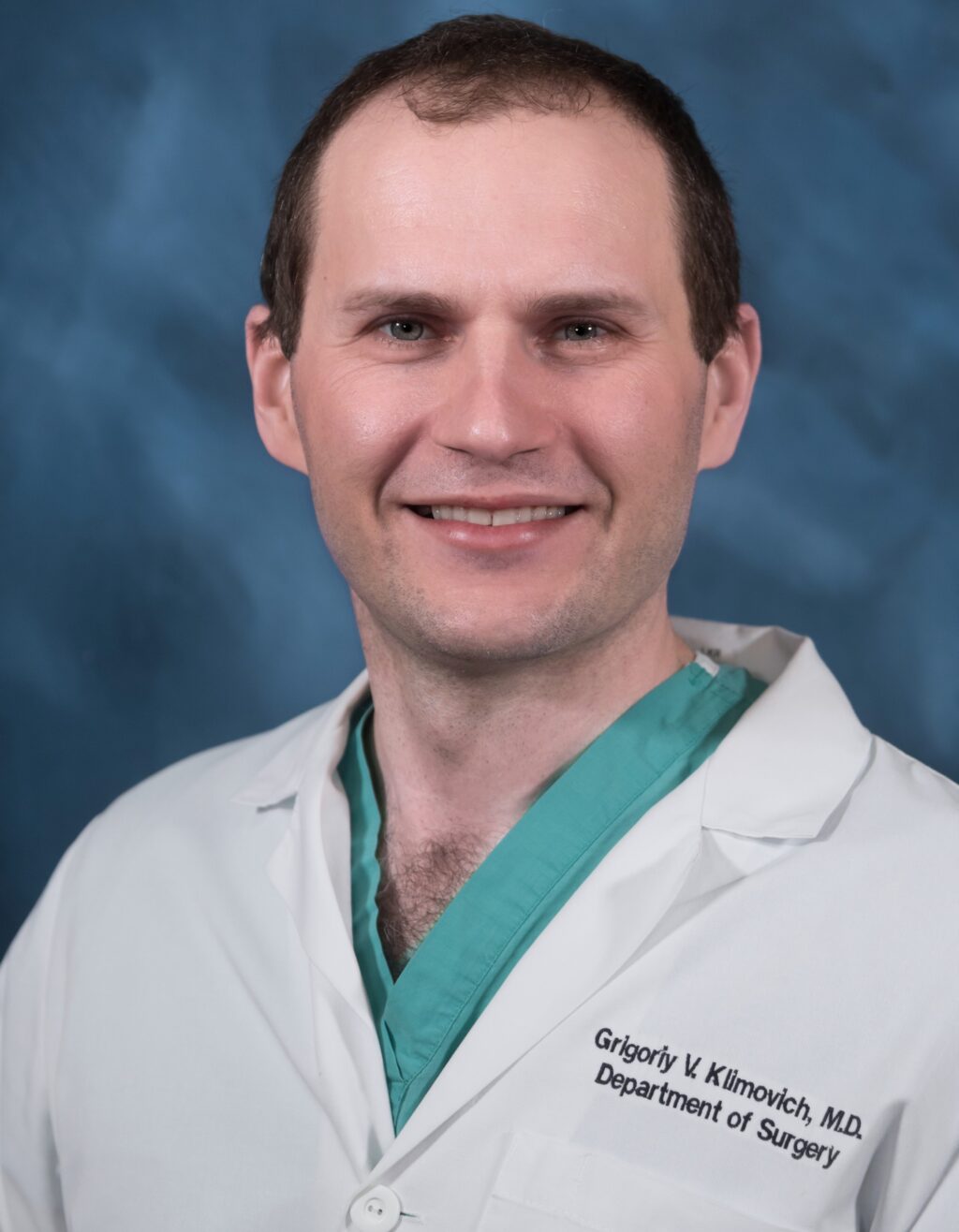Grigoriy Klimovich, M.D., FACS, a surgeon at Middlesex Health’s Center for Medical & Surgical Weight Loss, grew up on a farm in Ukraine with a large extended family. He became interested in medicine after breaking his arm and having a cast placed at the local hospital. During clinical rotations at the University of South Carolina’s School of Medicine, Dr. Klimovich said, “I just fell in love with surgery because I get to work with my hands to help people. And I saw how lives are changed!”
He had a similar response when he was introduced to bariatric surgery during his surgical residency at Jackson Memorial Hospital in Miami, Fla. “I saw people who were significantly overweight undergo surgery, have a substantial weight loss, and be able to move around better and play with their kids when they couldn’t before,” Dr. Klimovich explained. He also saw their high blood pressure, diabetes and sleep apnea significantly improve. This led him to pursue a surgical fellowship in minimally invasive bariatric surgery at Yale School of Medicine. He joined Middlesex Health three and a half years ago when he completed the fellowship.
Middlesex Health is proud to offer a comprehensive team approach to weight loss at its award-winning Center for Medical & Surgical Weight Loss. There they provide physical, emotional and social support to individuals seeking to achieve and maintain a healthy body weight. And, as is evident from the center’s name, both medical and surgical options for weight loss are available. Either option comes with lots of support to help individuals succeed. Patients may be referred to the center by their doctor but a referral is not required.
The center’s goal is to help patients achieve a sustainable weight loss. “I love when patients come and tell me ‘Hey, doc, thank you. I don’t have to stick myself with insulin,’ or ‘I don’t have to wear a CPAP machine anymore’,” said Dr. Klimovich. After the surgical procedure is complete or a patient has commenced medical treatment, the center continues to provide support and long-term follow up to patients. “We want our patients to have long-term follow up because we know that patients that do, they do better,” Dr. Klimovich continued, calling it, “follow up for life.”
Middlesex Health’s Center for Medical & Surgical Weight Loss has been an accredited comprehensive bariatric surgical center since 2012 and is recognized as a Center of Excellence by the American College of Surgeons and the American Society for Metabolic and Bariatric Surgery. It was the first weight loss center in Connecticut to receive this designation.
“The program is excellent because it demonstrates a high success rate with low complication rates,” explained Dr. Klimovich. The center performs better than the national average in many of the metrics used to evaluate weight loss programs. It prides itself on excellent care, attention and patient education.
Dr. Klimovich and Dr. Jonathan Aranow are the surgeons for the center. Dr. Aranow has actually been performing bariatric surgery at Middlesex Health since 2001; he was integral to growing the surgical program. The interdisciplinary team includes two advanced practice nurse practitioners (APRN), a program coordinator, psychiatrists and psychologists, and physical therapists as well as multiple dieticians, nurses and medical assistants, all with specialized training pertaining to the bariatric patient population. The program also maintains the necessary equipment to care for this population, such as appropriately sized beds and gowns. The team strives to provide personalized care and meet all the patients’ needs within the program. This enables patients to complete the process from initial evaluation to long-term follow up, all within Middlesex Health rather than needing outside referrals.
Obesity, the disease
Obesity was officially recognized as a disease by the American Medical Association in 2013. It is a complex chronic disease with many factors that contribute to a person’s excessive weight gain. Obesity increases an individual’s risk of diabetes, heart disease, stroke and certain types of cancer, which are major causes of preventable premature death.
Obesity is not determined just by a person’s weight. Body mass index (BMI) is a measure used to screen individuals for obesity. BMI does not measure body fat directly, but it has been correlated with more direct measures. BMI takes into account a person’s weight and height. It is calculated by dividing a person’s weight in kilograms by the square of their height in meters. BMI calculations should be used only as a screening tool for obesity. Any assessment of a person’s health or risks related to their weight should be made by a health care provider.
A healthy BMI is considered to be between 18.5 and 25. A BMI of 25 to 30 is deemed overweight. Obesity is considered a BMI of greater than 30 and severe obesity a BMI greater than 40. According to the U.S. Centers for Disease and Prevention (CDC), the prevalence of obesity increased from 30.5% to 41.9% of the adult population between 1999 and 2020 and severe obesity nearly doubled from 4.7% to 9.2%.
What to expect as a patient
Dr. Klimovich explained what you should expect as a patient at the center. Appointments are primarily in Middletown. However, Dr. Klimovich also sees patients in Madison twice a month and in New London monthly. Telehealth appointments can also be arranged.
To qualify for bariatric surgery, your BMI must exceed 40, or 35 if you also have diseases associated with obesity (diabetes, sleep apnea or high blood pressure). The ultimate weight loss goal is to lose 70% of excess weight. This generally takes about 16 months to accomplish.
The evaluation process has several components and takes 6 to 7 months before any surgical procedure is done. The center makes the journey easy to navigate by keeping you engaged, coordinating all the necessary appointments and being readily available to you. If you call the center, they will get back to you quickly, often within hours.
Initial conversations focus on understanding why you developed obesity in the first place. Providers will examine lifestyle and eating habits, encourage activity, and help you to develop skills to keep weight off. You will participate in nutritional counseling for 3 to 6 months. Because obesity is the result of many contributing factors, this multidisciplinary approach to treatment is important for the best results.
The surgeons and the APRNs work in tandem to educate you about your treatment options, including the expected benefits and potential risks so you can make the best choice for you. You may also be evaluated for other diseases—such as sleep apnea or gastroesophageal reflux disease (GERD)—as these may influence which options are best for you. If you pursue a surgical option then you may also have your lungs and cardiovascular systems evaluated to identify possible surgical risks.
Throughout the process and regardless of whether you pick medical or surgical weight loss, you are provided lots of support, first from the care team, but also the center has multiple, very active patient support groups. The groups vary according to the weight loss option you choose and where in the process you are. Average attendance at support group meetings is 50 people. The center’s website also contains many resources.
After starting medication or having surgery, you will have follow-up appointments. These will occur more frequently in the beginning, approximately every 3 months, then extend to every 6 months and finally yearly. If you miss an appointment, your care team will contact you to learn why and help you get back on track.
One of the reasons the center is designated as a Center of Excellence is because of its stellar outcomes. Weight loss programs are judged on various metrics, including hospital readmission rate, death rate, percent weight loss, resolution of comorbidities and complication rate. Middlesex Health’s Center for Medical & Surgical Weight Loss performs better than the national average in several of these metrics. Their patients have demonstrated an average decrease in BMI of 14.3 points while the national average is 11.4 points. The center’s resolution rates are 23% higher than the national average for hypertension, 13% percent higher for GERD and 1.9% higher for diabetes.
Persistence pays off
It was not an easy path for Dr. Klimovich to become a doctor. At the time he set his sights on medicine, no one in his extended family had ever gone to college. His parents did not have the means to send him to college much less medical school. However, his family immigrated to the United States when he was 14 and though he did not even speak English at the time, he viewed the move as an opportunity.
His family ultimately settled in South Carolina, where he worked hard to learn English and do well in school. Now he is fluent in Ukrainian, Russian and English. He worked full time while attending college full time. He started at a community college and then transferred to a four-year program where he earned a Bachelor of Science in Biology before going on for all his medical training.
Dr. Klimovich first came to Connecticut when he arrived for his surgical fellowship. “Connecticut reminds me of Ukraine with its four seasons,” he said. He and his wife have three children and enjoy the outdoors.
His life’s journey and witnessing the journeys of patients at Middlesex Health’s Center for Medical & Surgical Weight Loss provide proof that persistence pays off. Dr. Klimovich and all the care team members look forward to helping you achieve your weight loss goal.
You can request additional information about obesity, its risks, and available treatments from the Middlesex Health Center’s website at middlesexhealth.org/weightloss or by calling 860-358-2970. There are also several resources on the website, including recordings of educational seminars given by Drs. Klimovich and Aranow.







More Stories
Jamie Shawver, D.O.: The Modern-Day Family Doctor
Leading in Urologic Oncology: Ryan Dorin, M.D., Works on Expanding Patient Care
UConn Health Stands at the Forefront of Comprehensive Sickle Cell Treatment in the U.S.